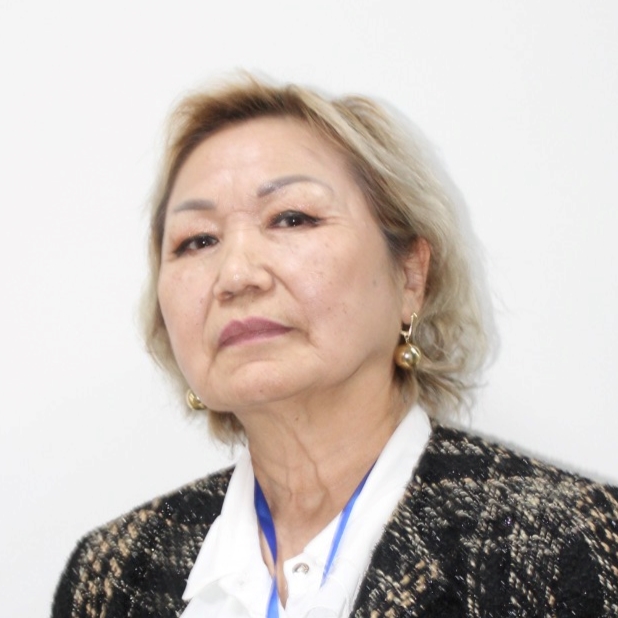
Aizhanova Aliya Elubaevna
Lecturer
The Department of «Smart technologies in engineering»
Master of technical sciences
email: a.elyubaevna@metu.kz

From 1986 to 1997, station engineer of the GTS of Aktobe
1997-2005 Engineer of the Development Department of Almatytelecom AODT Almaty
2005-2009.g senior lecturer of the Department "Robotics,Mechatronics electronics " KazNTU named after K.Satpayev
2009 - present Lecturer of the Department "Computer Engineering, Automation and Telecommunications" Kazakhstan University of Engineering and Technology
2008-2010. She studied in graduate school at the Tashkent Institute of Innovative Technologies
2012-2014 successfully completed a master's degree in "Radio Engineering, Electronics and Telecommunications" Kazakhstan University of Railways
Professional development:
2006 passed the school of a young lecturer of KazNTU named after K.Satpayev
2006 advanced training course "The use of an interactive whiteboard in the educational process"
2009-2016 carried out practical activities with the documentation of the academic part of the University and College Kazakhstan Engineering and Technological University
In 2014, she completed the course "Innovative learning technologies in the areas of technical disciplines "SuN Ray Training" Almaty
Atameken certificate for participation in international pedagogical readings "pedagogical innovations as a condition for improving the quality of education" Turan University Almaty 2016
2017 - teacher of special disciplines of the first category of the highest qualification level
2019 teacher of special disciplines of the highest category
2018 participated in the international scientific and practical conference
2019 advanced training "Application of modern distance learning systems in the educational process of the university"
2019 course on web programming in the amount of 72 hours
2018 advanced training course "The use of modern innovative technologies in the educational process"
Additional information:
2020 coordinator of the educational program "Radio engineering, electronics and telecommunications"
Awarded with a diploma of the Ministry of Education and Science on 8.12.2021
1981 - 1986 Tashkent Electrotechnical Institute of Communications. Automatic telecommunications.
2008 - 2010 Tashkent Institute of Innovative Technologies. ""Automatic telecommunication".
2009 - 2010 the exam for the candidate `s minimum special subjects ofTashkent,Specialized PhD Council. "Radio engineering, electronics and telecommunications".
2012 - 2014 Kazakhstan University of Railway Transport. "Radio engineering, electronics and telecommunications".
2016 - 2018 she studied at the doctoral school in Lublin Poland Polytechnic University. "Radio engineering, electronics and telecommunications".
Scientific work on the topic of the department:
1.Radio monitoring system for the detection of toxic and fire-explosive gases in the environment
Scientific work with students on the topic:
1. Prospects for the development of 5G in Kazakhstan
2. Cloud technologies in education
Publications
Scopus:
- Cherenkov, A.D., Kosulina, N.G., Yaroslavskyy, Y.I., Aizhanova, A., Tanas, J. / Justification of the electromagnetic impulse method destruction of insect pests in gardens / Proceedings of SPIE - The International Society for Optical Engineering, 2018, 10808, 108083P
- Borovska, T.M., Vernigora, I.V., Grishin, D.I., ...Gromaszek, K., Aizhanova, A./ Adaptive production control system based on optimal aggregation methods / Proceedings of SPIE - The International Society for Optical Engineering, 2018, 10808, 108086O
- Vysotska, O.V., Nosov, K., Georgiyants, M., ...Dzierzak, R., Aizhanova, A. / An approach to determination of the criteria of harmony of biological objects / Proceedings of SPIE - The International Society for Optical Engineering, 2018, 10808, 108083B
- Mokin, V.B., Kryzhanovskyi, Y.M., Yascholt, A.R., ...Ławicki, T., Aizhanova, A. / The method of multi-criteria ranking of monitoring stations for water discharge in rivers for determining priorities of their location / Proceedings of SPIE - The International Society for Optical Engineering, 2018, 10808, 108082Q
-
Publications of the Republic of Kazakhstan:
"Design method based on GPON technology" for Priority directions of agro-industrial complex development: global challenges and scientific and technical potential of Almaty, April 4, 2017 KazITU
Radio monitoring system for the detection of toxic and fire-explosive gases in the environment Bulletin of the Almaty University of Humanities and Technology No. 4(14) 2013
Fiber Bragg Gratings World Scientific and Technical Congress “Future Energy: Innovative Scenarios and Methods of their implementation" WSEC-2017
Innovationalyk technologiyalar .International Scientific and Practical Conference.KazITU 2021
Cloud technologies in education.International Scientific and Practical Conference.KazITU 2021
study guide:
Textbook "Fiber-optic transmission networks". Kazntu, Almaty, 2019
Textbook "Application of ultra-wideband signals for communication systems, radar and materials science" KazITU, Almaty, 2019
Tutorial "Cloud Computing Infrastructure" KazITU, Almaty, 2019